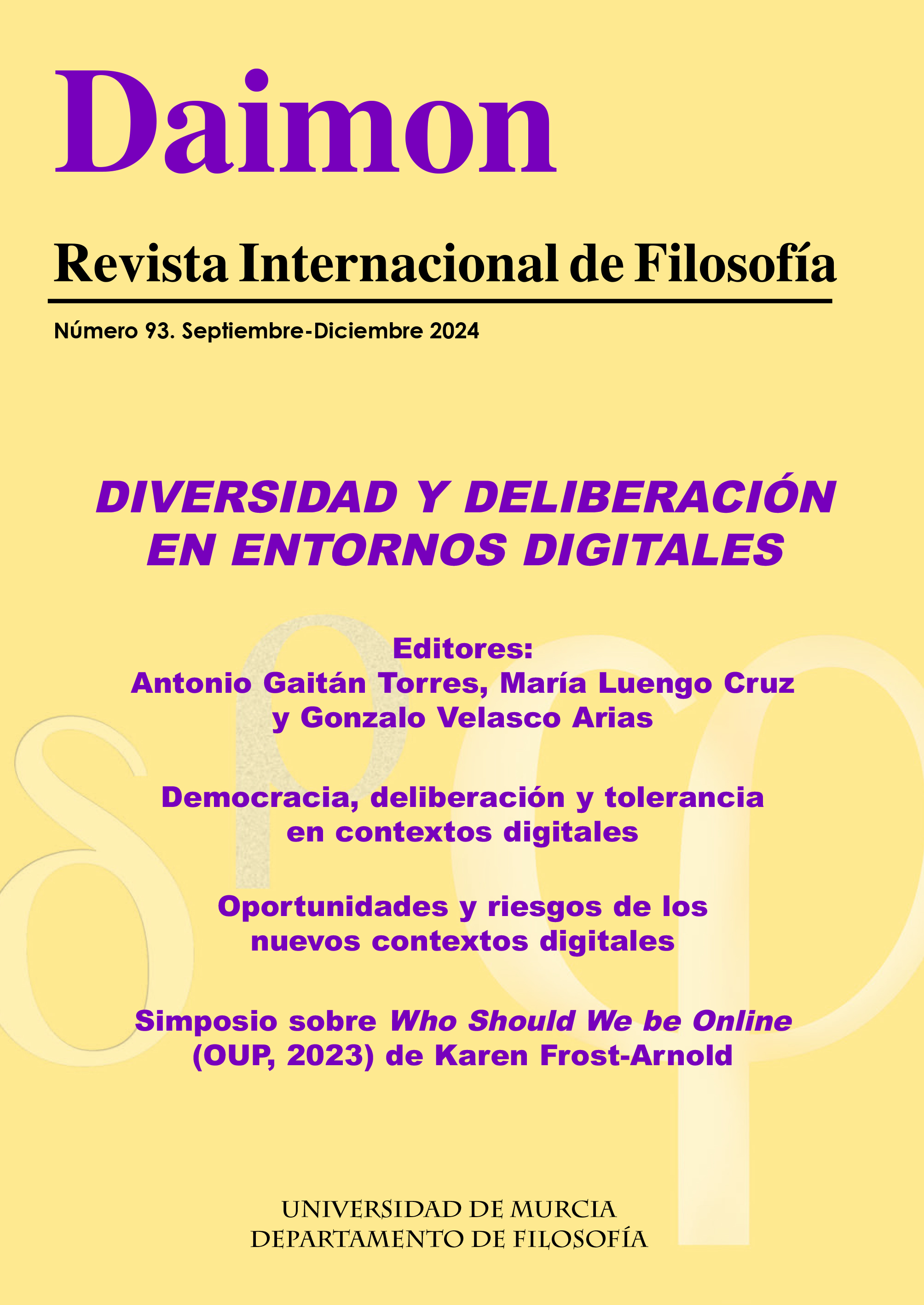¿Es la inteligencia artificial doxástica un igual epistémico?
Resumen
La inteligencia artificial doxástica (IAD) es un tipo de inteligencia artificial que reproduce actitudes doxásticas. Si la IAD cumple con las condiciones de paridad epistémica que se le exige a un humano, ¿podría ser también un igual epistémico? Dos iguales epistémicos sostienen propiedades cognitivas simétricas como la inteligencia, el razonamiento o la ausencia de sesgos. Para evaluar si alguien es un igual se tendrán en cuenta estas condiciones: (1) la igualdad probatoria, (2) la igualdad cognitiva y (3) revelación completa. La IAD cumple tanto (1) como (2), pero es en (3) cuando se descubre que no puede ser un igual epistémico. Ésta responde con la opinión popular más aceptada estadísticamente, es incapaz de sostener y defender sus propias afirmaciones y éstas no son un genuino acto de habla. Es una máquina doxástica incapaz de señalar cuáles son las razones que guían su respuesta.
Descargas
-
Resumen473
-
PDF201
-
HTML61
Citas
Audi, R. (2013). Dimensions of Intellectual Diversity and the Resolution of Disagreements. The Epistemology of Disagreement: New Essays, 205.
Baehr, J. (2011). The inquiring mind: On intellectual virtues and virtue epistemology. OUP Oxford.
Bistagnino, G. (2011). Epistemology of disagreement: Mapping the debate. Gli annali di LPF-Laboratorio di Politica comparata e Filosofia Pubblica, 6, 159-187.
Chalmers, D. J. (2023). Could a large language model be conscious?. arXiv preprint arXiv:2303.07103.
Christensen, D. (2007). Epistemology of Disagreement: The Good News. The Philosophical Review, 116(2), 187–217. http://www.jstor.org/stable/20446955
Christensen, D. (2009). Disagreement as evidence: The epistemology of controversy. Philosophy Compass, 4(5), 756-767.
Cocchiaro, M. Z. y Frances, B. (2021). Epistemically different epistemic peers. Topoi, 40, 1063-1073. doi:10.1007/s11245-019-09678-x
Dretske, F. I. (1981). Knowledge and the Flow of Information. MIT press.
Dretske, F. I. (2000). Perception, knowledge and belief: selected essays. Cambridge University Press.
Driver, J. (2000). Moral and epistemic virtue. Knowledge, Belief, and Character: Readings in Virtue Epistemology, Lanham, MD: Rowman & Littlefield, 123-34.
Elga, A. (2007). Reflection and disagreement. Noûs, 41(3), 478-502.
Frances, B. y Matheson, J., "Disagreement", The Stanford Encyclopedia of Philosophy (Winter 2019 Edition), Edward N. Zalta (ed.), URL = <https://plato.stanford.edu/archives/win2019/entries/disagreement/>.
Floridi, L. (2013). The philosophy of information. OUP Oxford.
Floridi, L. (2023). The Ethics of Artificial Intelligence: principles, challenges, and opportunities. OUP Oxford.
Frances, B. (2014). Disagreement. John Wiley & Sons.
Gutting, G. (1982) Religious Belief and Religious Skepticism. Notre Dame: University of Notre Dame Press.
Hassan, H. (2022, 4 enero). Google Maps: A simple explanation on how it detects traffic jams. Medium. https://medium.com/technology-hits/google-maps-a-simple-explanation-on-how-it-detects-traffic-jams-ce6940489c9c
Jäger, C. (2016). Epistemic Authority, preemptive reasons, and understanding. Episteme, 13(2), 167–185. doi:10.1017/epi.2015.38
Kelleher, J. D. (2019). Deep learning. MIT press.
Kelly, T. (2005). The epistemic significance of disagreement. Oxford studies in epistemology, 1(167-196).
Kelly, T. (2013). Disagreement and the Burdens of Judgment. The epistemology of disagreement: New essays, 31-53.
King, N. L. (2012). Disagreement: What's the problem? Or a good peer is hard to find. Philosophy and Phenomenological Research, 85(2), 249-272.
Lackey, J. A. (2013). Disagreement and belief dependence: Why numbers matter. In The epistemology of disagreement: New essays (pp. 243-268). Oxford University Press.
Lau, J. (2020, 3 septiembre). Google Maps 101: How AI helps predict traffic and determine Routes. Google. blog.google/products/maps/google-maps-101-how-ai-helps-predict-traffic-and-determine-routes/
Mehta, H., Kanani, P. y Lande, P. (2019). Google maps. International Journal of Computer Applications, 178(8), 41-46.
Rowland, R. (2017). The epistemology of moral disagreement. Philosophy Compass, 12(2), e12398. DOI 10.1111/phc3.12398
Searle, J. R. (1982). The Chinese room revisited. Behavioral and brain sciences, 5(2), 345-348.
Searle, J. R. (2000) El misterio de la conciencia. Padios. Madrid.
Zagzebski, L. T. (2012). Epistemic authority: A theory of trust, authority, and autonomy in belief. Oxford University Press.
Derechos de autor 2024 Daimon Revista Internacional de Filosofia

Esta obra está bajo una licencia internacional Creative Commons Reconocimiento-NoComercial-SinObraDerivada 3.0.
Las obras que se publican en esta revista están sujetas a los siguientes términos:
1. El Servicio de Publicaciones de la Universidad de Murcia (la editorial) conserva los derechos patrimoniales (copyright) de las obras publicadas, y favorece y permite la reutilización de las mismas bajo la licencia de uso indicada en el punto 2.
2. Las obras se publican en la edición electrónica de la revista bajo una licencia Creative Commons Reconocimiento-NoComercial-SinObraDerivada 3.0 España (texto legal). Se pueden copiar, usar, difundir, transmitir y exponer públicamente, siempre que: i) se cite la autoría y la fuente original de su publicación (revista, editorial y URL de la obra); ii) no se usen para fines comerciales; iii) si remezcla, transforma o crea a partir del material, no podrá distribuir el material modificado.
3. Condiciones de auto-archivo. Se permite y se anima a los autores a difundir electrónicamente las versiones pre-print (versión antes de ser evaluada) y/o post-print (versión evaluada y aceptada para su publicación) de sus obras antes de su publicación, ya que favorece su circulación y difusión más temprana y con ello un posible aumento en su citación y alcance entre la comunidad académica. Color RoMEO: verde.











